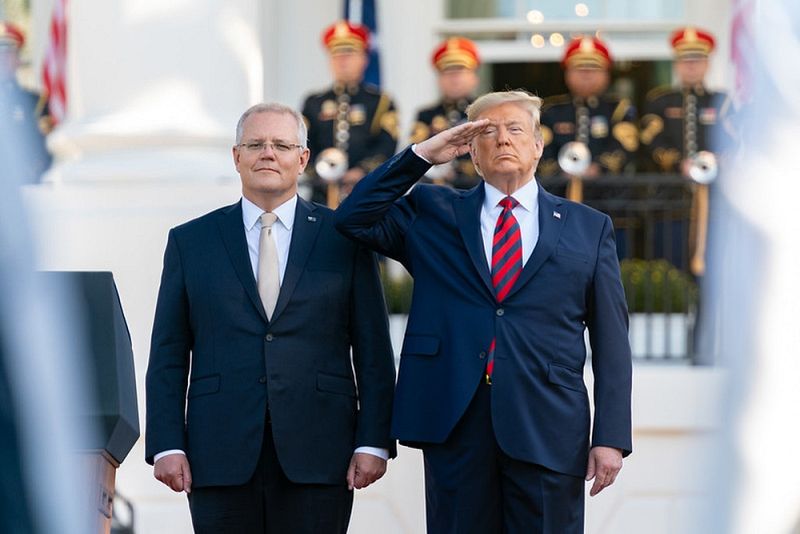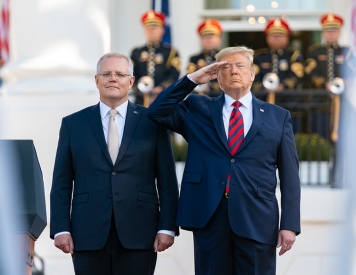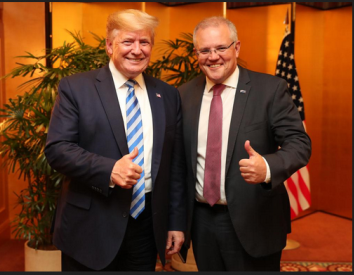In January 2021 the Independent and Peaceful Australia Network (IPAN) launched a "People’s Inquiry" into the costs and consequences of the U.S. alliance.
Its aim was to start a conversation and to get the public thinking and imagining what an independent and peaceful foreign policy would look like.
We received more than 280 submissions from environmental groups, leading academics and concerned citizens, and we are seeing recurring themes and consistent messages in the submissions that are now being collated and analysed by our panellists, who have recently released an interim report.
A fundamental proposition running through the submissions is that war is a choice for defence and foreign policy decision-makers, not an inevitability and that the wrong choice can be costly.
Unsurprisingly, the submissions focus on what has happened in Afghanistan. Diplomacy was shelved there by the U.S. 20 years ago. Australia's then-Prime Minister John Howard chose to follow the U.S. into that war without parliamentary or popular discussion or debate. That decision caused immense personal, social, economic and diplomatic costs for little if any real benefit to any country involved.
The submissions have highlighted the Australian public being sidelined in any debate about Australia’s defence and foreign policy decisions, particularly if they concern its alliance with the United States.
Despite the obvious interest in the area, Australia's foreign policy is rarely publicly discussed and never publicly debated, let alone democratically decided. The reluctance of politicians to discuss, offer or embrace new policy and the influence of lobbyists who are pursuing the agendas of their clients and not the best interests of Australia is of great concern to the public.
Coupled with revelations of disgraceful conduct both diplomatically – East Timor, France – and militarily –Afghanistan in particular – these things leave the yawning gap between public attitudes and government policies identified in the submissions.
Importantly, the submissions to the "People's Inquiry" go further than criticism and offer alternative policies. While the submissions are still being processed to draw out in-depth recommendations, there are certainly common calls from the public for change.
One example is that the decision to go to war must be decided in parliament, with evidence being tabled and the purpose, costs, benefits and consequences of military action being openly debated.
The Australian public also needs to be heard on issues of foreign policy, particularly as the world changes and Australia's existing policies seem to be locked in the past with costly consequences. Blindly following the U.S. into Afghanistan, and dumping French in favour of U.S. submarines, are two clear examples of this.
Australia’s foreign policies should be founded on popular consensus and should be determined independently of the United States.
Many people have contributed to this inquiry, the first of its kind giving people a chance to have their say on the matter of war. The nature and volume of submissions the inquiry has received suggest that its findings should be representative of the views held by the majority of concerned Australians.
Most recognise that Australia’s current trajectory unfortunately and unnecessarily destines us to a future of conflict.
The submissions are also very diverse, ranging from extremely detailed and considered works that could be reports in their own right, such as the submission by the Nautilus Institute for Security and Sustainability’s Richard Tanter, to short statements calling for peace by concerned citizens, often engaging with the issue for the first time.
Each and every submission is of value.
The inquiry’s findings, when published, should be of considerable historical significance. First, as a historical reference point for those who in the future will assess the efficacy of the government’s decisions and actions. Secondly, it should serve as a clarion call for the use of reason, diplomacy and the common sense of the electorate and elected representatives in making decisions about alliances and warfare in Australia’s best interests.
Kellie Tranter is a lawyer and a human rights activist. You can follow her on Twitter @KellieTranter. You can learn more about the IPAN'S 'A People’s Inquiry: Exploring the case for an Independent and Peaceful Australia' here.
Related Articles
- Transparency lacking in Australian defence policy
- A reflection of decades of failed U.S. national security policy
- Afghanistan, ‘anarchy’ and confecting a China threat
- Diplomacy in decline: Filling Australia's foreign policy void
- Australian sovereignty: The long and short of it
 This work is licensed under a Creative Commons Attribution-NonCommercial-NoDerivs 3.0 Australia License
This work is licensed under a Creative Commons Attribution-NonCommercial-NoDerivs 3.0 Australia License
Support independent journalism Subscribe to IA.















